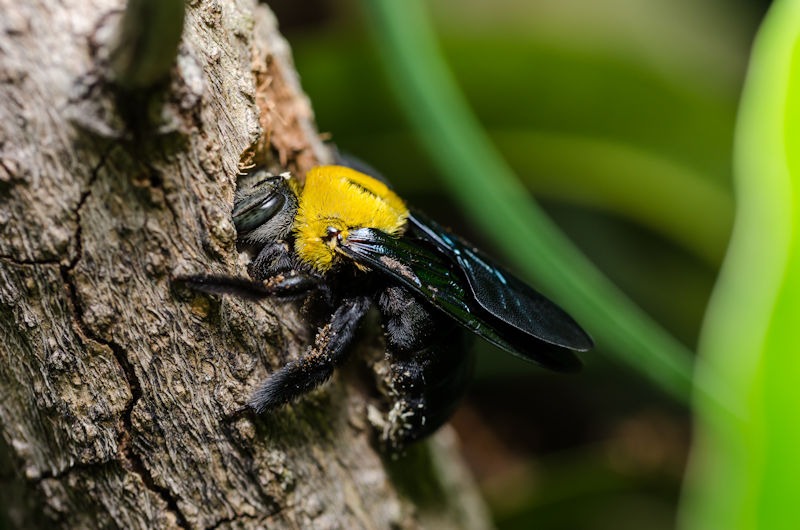The name “carpenter bee” seems a tad misleading, doesn’t it? After all, carpenters help build and repair buildings, not damage them “” yet, the latter is a top skill of the carpenter bee. The name describes their ability to drill through wood, but not with the intention of building a coffee table.
Carpenter bees are the largest native bees in the United States, and “” you guessed it “” they love wood. They are common in Northern Virginia and Southern Maryland, so you are probably all too familiar with their intimidating size and distinct buzzing. (But fear not, they rarely sting.) Their lifespan can reach three years, and, unlike the fuzzy bumblebee, they have black, shiny, hairless abdomens.
Although they are important pollinators, the presence of carpenter bees can be a nuisance. Their nesting behavior causes them to carve their way into wooden porches, decks, steps, and more.
So, this leaves us with one important question: Can carpenter bees damage your home? Yes, they sure can. But there are solutions.
Here is everything you need to know about carpenter bees in Northern Virginia and Southern Maryland:
Carpenter Bees Use Wood for Nesting
Carpenter bees aren’t just drilling into the wood for fun “” it’s essential for the females to lay their eggs. They are drawn to dead but non-decayed tree trunks, limbs, and the wood around your home (especially cedar, redwood, and soft pine).
Carpenter bees do not eat the wood; instead, they carve out near-perfect circles (about the size of a nickel) about one to two inches deep to build their nests. The females mix saliva and sawdust to create partitions between the eggs. Multiple bees can create several nesting cavities and tunnels within the wood.
The cycle of carpenter bee nesting repeats every year, and if they continue to dig into your home’s surfaces over time, it can cause significant damage.
How Can Carpenter Bees Damage Your Home?
The damage to your home is usually found on decks, steps, outdoor furniture, swingsets, window trim, railings, or fence posts. (Basically, anywhere there is soft, unpainted wood.) If you’re wondering whether or not your home is dealing with a carpenter bee infestation, there are a few signs to look out for:
- Circular holes on wooden surfaces that are about half-an-inch wide
- Wood shavings around the holes (since they do not eat the wood, they move it aside as they dig)
- Yellow-brown stains around the nest cavities (an unfortunate sign of carpenter bee feces)
- A group of bees (males) guarding the places where females nest (not to worry, male carpenter bees cannot sting)
The home damage by carpenter bees worsens if the infestation is left untreated. Too many tunnels can lead to more severe issues, such as structural damage (stairs or railings collapsing, for example) or water damage from moisture buildup.
To prevent carpenter bee nesting, try painting all of your wood surfaces, use non-wood surfaces instead (such as vinyl), fill cracks and holes, or replace the wood entirely. If the issue persists, professional treatment may be needed.
We Can Help With Carpenter Bee Home Damage
Can carpenter bees damage your home without treatment? Absolutely. But that’s where we come in!
Carpenter bees in Southern Maryland and Northern Virginia typically appear in the spring and summer, so now is a great time to start preparing. At Planet Friendly Pest Control, we use green pest control products to keep your home bug-free. Our Low-Impact Perimeter Protection Plan will give you peace of mind knowing that bugs will stay where they’re meant to be “” outside.
Ready to protect your home from the threat of carpenter bees? Contact us today for a quote!
NEED HELP?
If you live in Southern Maryland, or Northern Virginia
FIND YOUR SOLUTION HERE
People, Pet & Pollinator Safe! Pest control for people who care.
